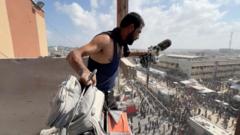What Happened in the Israeli Double Strike on the Gaza Hospital?

Published: 2025-08-25 20:00:39 | Category: world
The recent Israeli airstrikes on Nasser Hospital in Khan Younis, Gaza, resulted in the tragic deaths of 20 individuals, including journalists and healthcare workers. The incident was marked by a double strike, occurring minutes apart, which has raised serious concerns regarding the targeting of civilians and reporters in conflict zones.
Last updated: 30 October 2023 (BST)
Key Takeaways
- The Nasser Hospital was struck twice within minutes, leading to significant casualties.
- Five journalists from various international media outlets were among the deceased.
- Israeli Prime Minister Benjamin Netanyahu described the incident as a "tragic mishap".
- The double-tap airstrike tactic has drawn widespread condemnation for its potential to maximise casualties.
- Calls for an independent investigation into the attacks are growing from global leaders and organisations.
Overview of the Incident
On 30 October 2023, Nasser Hospital in Khan Younis was hit by Israeli airstrikes, leading to at least 20 fatalities, including five journalists. The first strike occurred at approximately 10:00 local time, followed by a second strike around ten minutes later, targeting those who had rushed to assist after the initial explosion. This pattern of attack has raised suspicions about the intent behind the strikes, particularly given the high number of casualties among civilians and media personnel.
The Impact on Journalists and Healthcare Workers
The five journalists who lost their lives in this tragic event were working for reputable international news outlets such as Reuters, Associated Press (AP), Al Jazeera, and Middle East Eye. Their deaths highlight the increasing danger faced by journalists operating in conflict zones. The Committee to Protect Journalists (CPJ) has reported that over 190 journalists have been killed in the ongoing conflict, with the majority being Palestinian reporters targeted in Israeli attacks.
Profiles of the Slain Journalists
Among those killed were:
- Husam al-Masri: A cameraman for Reuters, al-Masri was filming a live report when the first strike hit.
- Mariam Dagga: A freelance journalist for AP, Dagga leaves behind a young son evacuated from Gaza earlier.
- Mohammad Salama: Worked for both Al Jazeera and Middle East Eye; he was engaged to fellow journalist Hala Asfour.
- Ahmed Abu Aziz: A freelancer for Middle East Eye, based in Khan Younis.
- Moaz Abu Taha: Collaborated with various outlets, including Haaretz, focusing on humanitarian issues.
Reactions from Leaders and Organisations
The Israeli Prime Minister described the incident as a regrettable mistake, stating that military authorities are conducting a thorough investigation. However, the lack of clarity surrounding the military's decision-making process has drawn criticism. UN Secretary-General António Guterres condemned the attacks, calling for a prompt investigation into the killings of medical personnel and journalists.
International Response
Global reactions have been swift. UK Foreign Secretary David Lammy expressed horror at the incident, while French President Emmanuel Macron labelled the strikes as "intolerable", calling for the protection of civilians and journalists. Germany's foreign office also expressed shock at the events. Meanwhile, US President Donald Trump, though initially unaware of the strikes, expressed dissatisfaction upon learning of the tragedy.
Understanding the Double-Tap Strategy
The term "double-tap" refers to a military tactic where a second strike is executed shortly after the first, targeting first responders and onlookers. This method is controversial due to its potential to increase civilian casualties and has drawn widespread condemnation from human rights groups. Reports indicate that the second strike on Nasser Hospital was intentional, leading to significant loss of life among those aiding victims of the first attack.
Calls for Accountability and Investigation
Media organisations and advocacy groups have called for accountability regarding the targeting of journalists in conflict zones. The Foreign Press Association in Israel and the Occupied Palestinian Territories has urged international leaders to act decisively against what they describe as a pattern of targeting journalists. The CPJ highlighted the ongoing danger faced by reporters in Gaza, stressing the urgent need for protective measures and accountability for such attacks.
The Broader Context of Conflict in Gaza
The ongoing conflict in Gaza has seen an escalation of violence, with numerous airstrikes resulting in civilian casualties. As international scrutiny increases, calls for a ceasefire and humanitarian access to the region have become more pressing. The situation underscores the need for a comprehensive approach to address both the immediate humanitarian crisis and the underlying political issues contributing to the conflict.
What Happens Next?
As the situation unfolds, the Israeli military has promised an internal investigation into the incident. However, the timeline for this inquiry remains uncertain. Observers and human rights advocates will be watching closely to see if this leads to meaningful accountability and changes in military protocols regarding the protection of civilians and journalists in conflict zones.
FAQs
What is a double-tap airstrike?
A double-tap airstrike refers to the military tactic of launching a second attack shortly after the first, targeting those responding to the initial strike. This method is controversial due to its potential to increase civilian casualties.
How many journalists have been killed in the conflict?
According to the Committee to Protect Journalists, over 190 journalists have lost their lives in the ongoing conflict, with a significant number being Palestinians killed in Israeli attacks.
What has been the international response to the Nasser Hospital strikes?
Global leaders, including those from the UK, France, and Germany, have condemned the strikes, calling for independent investigations and immediate humanitarian access to Gaza.
What action is being taken by Israel regarding the attack?
Israeli Prime Minister Benjamin Netanyahu has stated that a thorough investigation is underway to understand the circumstances surrounding the attack on Nasser Hospital.
What protections exist for journalists in conflict zones?
International law provides certain protections for journalists covering conflicts, but enforcement is inconsistent, and many journalists continue to face significant risks in war zones.
As the crisis in Gaza continues to unfold, the world watches closely. The tragic loss of life at Nasser Hospital serves as a stark reminder of the dangers faced by those working to document and report on the realities of war. Will this incident prompt meaningful change in how conflicts are reported and how journalists are protected? #Gaza #Journalism #HumanRights



